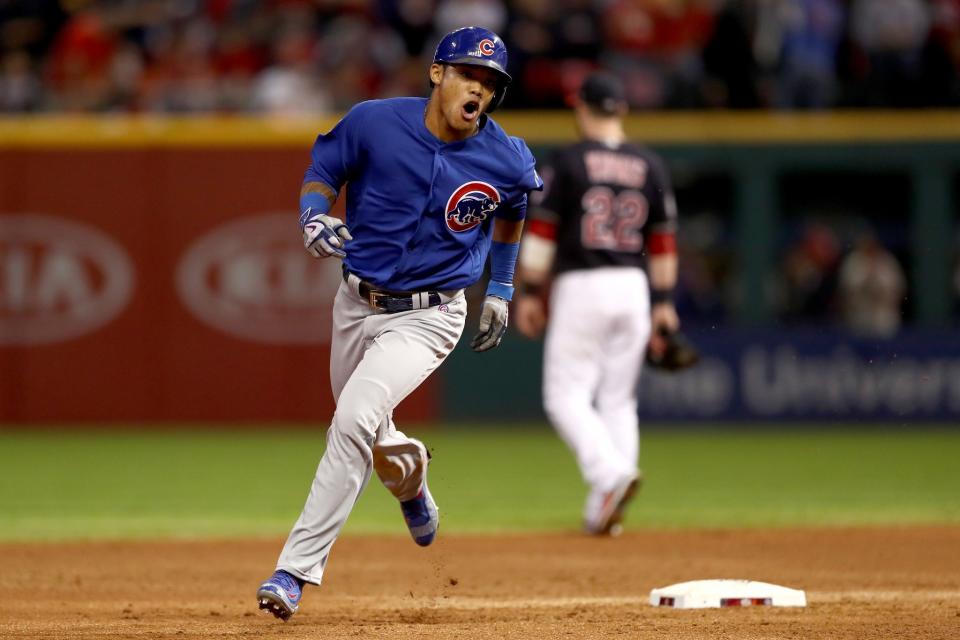Cubs rout Indians to force Game 7 of World Series
CLEVELAND – Game 7 of the World Series is coming Wednesday. This seemed almost preordained, even after the Cleveland Indians found themselves in control of the Chicago Cubs. Both of these franchises have spent far too long craving a championship for it to come down to anything less than a do-or-die, empty-the-bullpens, batten-down-the-hatches dance to 27 outs. This is a baseball dream, and it’s coming live at 8 p.m.
Game 6 of the World Series came and went Tuesday. It was a blowout. The Cubs thumped the Indians, 9-3, and made the three-games-to-one advantage Cleveland held seem like a millennium ago. By the third inning, flights were being booked into Cleveland and ticket prices were spiking and the inevitability of 176 years of championship-free baseball boiling down to one game was titillating the collective mind of a country suddenly enthralled with postseason baseball.
Mostly, admittedly, because of the Cubs. Lest this further the Indians’ Other Team™ complex, the Cubs are the story captivating the country, 108 years of heartbreak hanging over their heads, their binary destinies either a delicious, satisfying end to it all or the most painful tease yet. The Indians aren’t some mediocre story, of course, not with their 68 years and the prospect of blowing the same lead their across-the-street neighbors, the Cavs, came back from to steal a championship from the Warriors over the summer.

This is baseball, of course, and there is no singular, transcendent figure like LeBron James patrolling the diamond for the either team. Corey Kluber has been the closest thing, and he’ll start for the third time this series, giving Cleveland its best hope after Trevor Bauer lost Game 5 and Josh Tomlin imploded in Game 6, the latter in a first-inning flurry and third-inning meltdown.
The Cubs’ first run-scoring burst wasn’t entirely Tomlin’s fault. After Kris Bryant walloped a 433-foot home run with two outs, Anthony Rizzo and Ben Zobrist roped back-to-back singles. Addison Russell followed with a fly ball to right-center field that should’ve been an out until a miscommunication between center fielder Tyler Naquin and right fielder Lonnie Chisenhall caused the ball to drop between them. Rizzo and Zobrist scored, staking Cubs starter Jake Arrieta a three-run lead.
Even though he needed no more, the Cubs provided it in the third. A walk and two singles loaded the bases and prompted Indians manager Terry Francona to pull Tomlin. Russell deposited the third pitch from reliever Dan Otero 434 feet over the left-center field wall, becoming the youngest player to hit a grand slam in a World Series since Mickey Mantle and tying a World Series record with six RBIs. It was the third inning, the Cubs led 7-0 and Game 7 was practically inevitable.
Cleveland did muster a pair of runs and was threatening in the seventh, with two on and two out. Cubs manager Joe Maddon summoned closer Aroldis Chapman, who squeezed out of the jam by a hundredth of a second. Francisco Lindor hit a chopper to Rizzo, whose flip to Chapman came just in time to get Lindor – a call that was reversed after first-base umpire Sam Holbrook called him safe.

The next inning was little trouble for Chapman, and Maddon pulled him after a walk in the ninth at 20 pitches, a number that shouldn’t significantly affect his ability to pitch multiple innings in Game 7. It was a call made easier by Anthony Rizzo’s two-run home run in the top of the ninth that gave Chicago a seven-run lead. Pedro Strop gave up a run and Travis Wood recorded the final out for the Cubs. With starters Jon Lester and John Lackey both available to pitch in Game 7, Chicago’s bullpen is fortified for its run at history.
The Cubs are trying to do something only the 1925 Pirates, 1958 Yankees, 1968 Tigers, 1979 Pirates and 1985 Royals have done: come back from a 3-1 deficit in the World Series. Here’s an even more heartening note for Chicago: Only the 1967 Red Sox and 1972 Reds game back to force a Game 7 after being down 3-1 and lost the finale. These Cubs have adopted something of a Rocky theme, with the original film and its sequels playing on clubhouse TVs before Game 5, a tense 3-2 affair, nothing like the blowout of Game 6. It still imbued in Chicago a greater sense of hope than the gloom that hung over the city after Cleveland took Games 3 and 4 at Wrigley Field. Game 5 brought back the signs that said It’s Gonna Happen and left at least some semblance of optimism going into Tuesday.
It was warranted, and now, with standing-room-only tickets starting at $2,000 and actual seats running closer to $2,500, with the highest TV ratings in decades expected, with Major League Baseball riding this close-to-a-dream series to its close-to-a-dream conclusion. Now all it needs is a compelling Game 7 that will remind one city why the wait is worth it and the other about how getting so close can feel worse than not being there at all.

